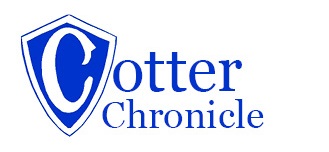Cotter needs to offer stronger Financial Education
“I got stock money for Christmas’ I tell my friend. In response to her confused look, I began to explain (my admittedly minimal knowledge) about investing in stocks.
Since I was ten years old, my dad has consistently given me “stock money” for Christmas, instructing me on how to use that money to invest through stocks. But I am definitely no expert in financial matters, and I’m guessing that most students at Cotter don’t have a father that is a financial expert.

Cotter is neglecting one of the most important areas of our schooling; finances. Other than the few Cotter students who participated in the “Personal Finance Decathalon” team challenge, Cotter does not provide much financial schooling. There is an economics semester in senior social studies classes, but it is not enough.
More financial schooling is important, as no matter which job or vocation students choose after Cotter, we need to learn to manage money. Cotter is not alone in this, however; many schools do not have adequate financial teachings embedded in their curriculum. As of now, only seven states require a full personal financial course, and only 21 require some form of financial education. (according to CNBC article)
The importance of financial education became evident in 2020-2021, as the Covid pandemic sparked numerous worries about family finances. News outlets caught onto this, and a plethora of news articles and op-eds were written about financial education during this time- either touting the benefits or criticizing time wasted. This debate centers around whether financial education can change poor financial habits later in life, what kind of financial knowledge needs to be learned, and whether or not this learning should be at school.
What Kind of Financial Knowledge:
Students don’t need to become experts, but should at least know the basics. According to an article by Forbes, a leading financial and business news site, a teenager “shouldn’t leave the house” without knowledge of budgeting, credit cards, bank accounts, savings, and credit scores. Also, according to Bureau of labor statistics, 62% of American teenagers enroll in college directly after high school, or have a job. So other financial concepts teens should learn are student loans and taxes.
Where Financial Knowledge Should be Learned:
Bank accounts, savings, student loans, etc. are necessary for a teenager to survive in outside of their parent’s house. But don’t parents know all of this already, and can teach their children these habits? According to one study mentioned by CBS news, 70% of Americans struggle financially in at least one aspect. So are parents the best teacher of good financial habits to their children? Adults themselves don’t think so. According to one survey by the financial educators council, 84.5% of respondents wanted financial education in schools. So, over half of Americans are relying on school to teach their children how to survive financially.
Does Financial Education Change Financial Behaviors:
One significant argument against financial education is that students don’t remember or use the knowledge they learned, so personal financial education is a large time-waster. However, many of the most recent meta-study analysis show at least a small positive improvement in financial matters after financial education (with this metastudy done in 2020). One caveat of this study is that it focuses on basic financial literacy concepts- like budgeting, saving, or credit scores. It does not go into more complex concepts, like loans, taxes, stocks/bonds, or real estate. However, all of these things are important to learn to go to college, get a house/apartment, and save/invest for the future, so I believe they should be included in a financial education class (even if there is no solid data showing that students retain this knowledge from financial education classes). Even if students don’t remember much from these complex topics, they are at least exposed to them and the possibility that they may be needed in the future.
However, schools are busy places. Students may not have time for a separate personal finance class to learn all of this. So, maybe Cotter could consider adding some personal finance into another class’s curriculum, or perhaps add a new elective if there is enough interest. Cotter could even hold an all-school presentation during Flex for the most basic concepts. Either way, personal finance is an important part of a high school education, which I hope Cotter will add more of into their curriculum.






